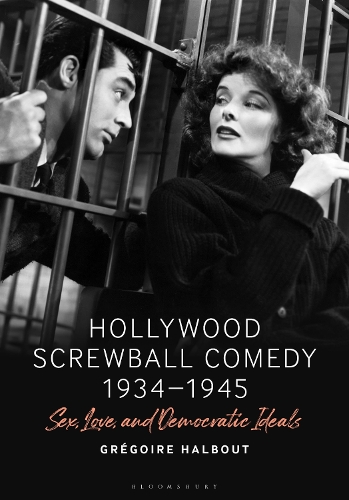
Hollywood Screwball Comedy 1934-1945: Sex, Love, and Democratic Ideals
(Paperback)
Available Formats
Publishing Details
Hollywood Screwball Comedy 1934-1945: Sex, Love, and Democratic Ideals
By (Author) Grgoire Halbout
Bloomsbury Publishing PLC
Bloomsbury Academic USA
23rd February 2023
United States
Classifications
Tertiary Education
Non Fiction
791.43617097309041
Winner of Choice Outstanding Academic Title 2022 (United States)
Physical Properties
Paperback
352
Width 178mm, Height 252mm, Spine 20mm
680g
Description
A 2022 CHOICE Outstanding Academic Title Love at first sight, whirlwind marriages, break-ups, divorces, remarriage What accounts for the enduring success of the Hollywood madcap comedies of the 1930s Directed by masters of comedy (Hawks, LaCava, Leisen, Ruggles...) and featuring the decades most iconic stars (Colbert, Dunne, Grant, Hepburn...), these films set romantic comedy standards for decades to come. Screwball comedy embarked on two challenging missions: to poke fun at established social norms and to undermine stereotypical depictions of gender roles, putting forward a discourse that postulated the possibility of equality between men and women. Grgoire Halbouts reexamination of screwball comedy provides a comprehensive overview of this (sub)genre, eschewing the auteurist approach and including minor works never before analyzed through the screwball lens. His book explains how these screwball stories met the expectations of a booming American middle class eager for the liberalization of morals, with daring plots, verbal humor and slapstick techniques. Building on the work of Cavell, Altman and Gehring, as well as international and French scholarship, Halbouts investigation unfolds in three parts. He first establishes a definition of Hollywood screwball comedy through a cross-sectional analysis of its socio-historical context and an in-depth examination of the genre. He then situates screwball comedy in relation to its institutional context. An exclusive study of archival material explains the emergence of a screwball aesthetic meant to subvert the prohibitions of the 1934 Hollywood Production Code through a verbal and visual rhetoric of diversion and mitigation. Finally, Halbout explores the social function of the genres placement of romantic intimacy at the center of the public sphere and the democratic debate, confirming that screwball eccentricity upholds Americas founding values: freedom of speech, free consent, and contractual engagement.
Reviews
The book is smartly written and deeply researched, and it joins foundational work by such scholars of the genre as Stanley Cavell, Kathrina Glitre, and Wes Gehring ... This indispensable book will be valuable for those interested in screwball comedies or Hollywood history. Summing Up: Essential. All readers. * CHOICE *
Synthesizing major strands of French and English-language scholarship on the theatrical and cinematic traditions of romantic comedy, Grgoire Halbouts Hollywood Screwball Comedy,1934-1945 offers a fresh and lively reappraisal of Hollywood screwball comedies as a distinctly American film genre. The scope of his approach alone is impressive. Adroitly side-stepping the pitfalls of genre studies that are limited to the inspection of a handful of celebrated films, Halbout identifies and explores an expansive corpus, one with permeable boundaries and in flux throughout the years bridging the Great Depression and the Second World War. With exactness, he also dives deeply into the records of Production Code Administration to demonstrate how evolving censorship practices in Hollywood triggered the emergence of new visual and verbal comic styles. He charts a cultural discourse crisscrossed with contradictory and conflicting voices, echoing public debates about sex, intimacy, and marriage at a time when a democratic mythos was under great strain. Brought to light in these pages are the institutional practices and creative responses through which the dialects and effects of 'screwball' surfaced and flourished on and beyond the screen. * Charles Wolfe, Professor of Film and Media Studies, University of California, Santa Barbara, USA *
Initiated and propelled by the writing of Stanley Cavell, Grgoire Halbout offers here a capacious yet discerning analysis of the remarkably fecund genre known by the disarming, perhaps misleading name screwball. Delighting in the glories of taking democratic entertainment seriously, Halbout treats readers to a lively taxonomy of the characteristics and criteria that make these films recognizable, including savvy assessments of the many directors who artfully troped love and sex into conversationthereby eliding with comic flair the chaste restrictions of the Hays Code. Moreover, despite the madcap and zany attributes of these plots and their characters, pursuits of happinessin their many incarnationsremain of immanent concern for one and all, on screen and off. In Halbouts company, we contend with the exigencies of marriage; the charged private and public spaces of intimacy and power; and the vexed romance of democracy. To these ends, Halbout seizes upon the narrative traits that keep these indelible films fresh, while encouraging us to ponder how and why they proliferated. Though readers familiar with Cavells contributions will recognize his films in the line-up, they will also encounter an expanse of additional works that thrillplacing the achievements of the marquee instances in dialogue with the lesser known. Befitting his signal inspiration, Halbout sustains Cavells influential investigation and extends it in dynamic ways, delivering in this volume what amounts to a now-indispensable companion for exploring the moral and aesthetic incitements of the genreespecially among its hilarious and profound exemplars. * David LaRocca, Cornell University, USA and editor of The Thought of Stanley Cavell and Cinema and Movies with Stanley Cavell in Mind *
Author Bio
Grgoire Halbout is Associate Professor of English and Cinema at the University of Tours, France. He writes in French and English about Hollywood comedy and the social function of cultural industries, as well as gender and sexuality in contemporary film and television.
